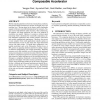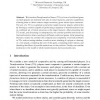152
click to vote
EMSOFT
2010
Springer
15 years 8 days ago
2010
Springer
Many real-time applications are designed to work in different operating modes each characterized by different functionality and resource demands. With each mode change, resource d...
122
click to vote
CNSM
2010
15 years 9 days ago
2010
Cloud systems require elastic resource allocation to minimize resource provisioning costs while meeting service level objectives (SLOs). In this paper, we present a novel PRedictiv...
114
Voted
CISIS
2010
IEEE
15 years 9 days ago
2010
IEEE
As Grid infrastructures become more widely used by the academic and commercial world, the problem of resource allocation increases in complexity. Resource trading markets are one m...
125
click to vote
CASES
2010
ACM
15 years 9 days ago
2010
ACM
Mobile computing platforms in the form of smart phones, netbooks, and personal digital assistants have become an integral part of our everyday lives. Moving ahead to the future, m...
143
click to vote
RTAS
2010
IEEE
15 years 20 days ago
2010
IEEE
This paper describes the design and implementation of a pervasive computing framework, named Physicalnet. Essentially, Physicalnet is a generic paradigm for managing and programmi...
123
Voted
PROCEDIA
2010
15 years 20 days ago
2010
With the offer from cloud computing providers, scientists have the opportunity to utilize pay-as-you-go resources together with their own and shared resources. However, scientist...
116
click to vote
MFCS
2010
Springer
15 years 21 days ago
2010
Springer
Abstract. We initiate a purely algebraic study of Ehrhard and Regnier’s resource λ-calculus, by introducing three equational classes of algebras: resource combinatory algebras, ...
106
click to vote
MFCS
2010
Springer
15 years 21 days ago
2010
Springer
We introduce Transformation Games (TGs), a form of coalitional game in which players are endowed with sets of initial resources, and have capabilities allowing them to derive certa...
126
click to vote
JUCS
2010
15 years 21 days ago
2010
: Mobile agent technology advocates the mobility of code rather than the transfer of data. As data is found in several sites, a mobile agent has to plan an itinerary to visit sever...
112
Voted
IEEECIT
2010
IEEE
15 years 23 days ago
2010
IEEE
Abstract—This paper examines the economics of cloud computing charging from the perspective of a supercomputing resource provider offering its own resources. To evaluate the comp...


